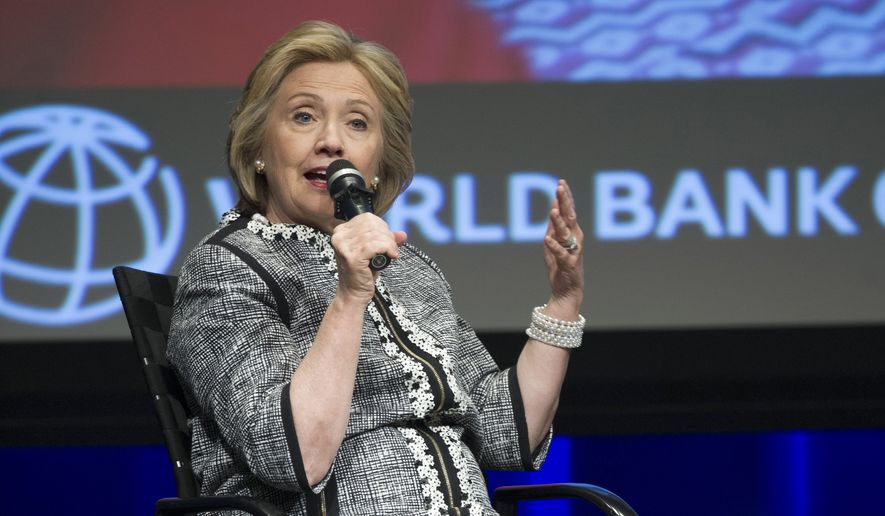When your own minimum wage reportedly is in the neighborhood of $200,000 a speech, it might be difficult to sell yourself as the populist champion of the working class.
In recent weeks, Hillary Rodham Clinton has begun a calculated transition from respected diplomat to fierce advocate for the 99 percent, using a “haves versus have-nots” message to build support among progressives who are desperate for a strong voice to battle Wall Street, protect entitlement programs such as Social Security and promote income equality.
But for Mrs. Clinton, a rich, successful woman and part of one of America’s most powerful political families, there are questions about how effectively she can carry that banner if she runs for president in 2016.
Her comments indicate that she understands which way the political wind is blowing, at least within the progressive wing of the Democratic Party.
“Our society is healthiest and our economy grows fastest when people in the middle are working and thriving and when people at the bottom believe they can make their way into that broad-based middle,” Mrs. Clinton recently told an audience in Washington. “For too many families in America today, that isn’t the way it works anymore. Instead of getting ahead, they’re finding it harder than ever to get their footing in our changing economy. The dream of upward mobility that made this country a model for the world feels further and further out of reach.”
Mrs. Clinton’s message — reminiscent of John Edwards’ “two Americas” refrain during his failed 2008 presidential run — surely will appeal to many on the left and perhaps many swing voters in states where the former first lady has had political success. She bested Barack Obama in Pennsylvania and Ohio during the 2008 Democratic presidential primaries, with strong support among blue-collar, working-class Democrats.
PHOTOS: Scenes from Rolling Thunder
Despite Mrs. Clinton and her husband, former President Bill Clinton, having an estimated combined net worth of $100 million to $200 million, some progressive leaders believe the former secretary of state still can deliver the populist pitch — if she does so with a genuine voice.
If her populist message sounds like political opportunism, however, she risks damaging herself and being overtaken by someone who can more forcefully take on the nation’s 1 percent, said Adam Green, co-founder of the increasingly powerful Progressive Change Campaign Committee.
“If Hillary Clinton campaigns on reforming Wall Street, jailing Wall Street bankers who broke the law, expanding Social Security benefits and investing in government jobs — and fights those fights in a way that shows her heart is in it — voters will reward her,” he said. “If it sounds like lip service, a more genuine-sounding populist, Democrat or Republican, may capture the imagination of voters.”
Democrats are making the case that Mrs. Clinton truly is passionate about the plight of America’s working class and isn’t simply latching on to the populist movement for her own political benefit.
“For decades, Hillary Clinton has been fighting for income opportunity, working to raise the minimum wage and implementing policies to lift families out poverty — long before doing so was the trendy thing to do,” said Adrienne Elrod, communications director at Correct the Record, an arm of the liberal super PAC American Bridge 21st Century that responds to conservative attacks on Democratic candidates, or prospective candidates in Mrs. Clinton’s case.
“Her long-term efforts to make a better future for all Americans have earned her the admiration, respect and trust of a majority of people across this country,” Ms. Elrod said.
PHOTOS: Top 10 U.S. fighter jets
Mrs. Clinton’s situation surely isn’t new. Democrats point to other wealthy individuals, such as Franklin Delano Roosevelt, who have gone on to become president and had a positive impact on American society, and the middle class in particular.
More recently, it was Mr. Edwards who, despite being a wildly rich lawyer whose fortune was made through his work on class-action lawsuits, sought to carve out a niche as the voice of poor Americans struggling to break into the middle class and being held down by a system that aids Wall Street millionaires more than average citizens.
Top-level aides on the Edwards campaign said the personal wealth of the former senator from North Carolina was discussed internally as something that could work against his message.
But ultimately, they said, merely bringing attention to the issue was politically effective and a service to the larger national debate.
“Was it a concern that people would call out John Edwards — he was very wealthy and he was talking about ’two Americas?’ Sure,” said Christina Reynolds, who served as research director and senior adviser for communications on the 2008 Edwards campaign. “But there’s also the belief that someone shining a light on this issue was a helpful thing. I think we’re in a place where people certainly recognize there are big discrepancies at the very top and what a lot of families are living through. John Edwards talked about it. It’s been Occupy Wall Street. It’s been looking at the ’too big to fail’ [banks] and families that were failing and feeling like the government wasn’t there for them.”
• Ben Wolfgang can be reached at bwolfgang@washingtontimes.com.




Please read our comment policy before commenting.